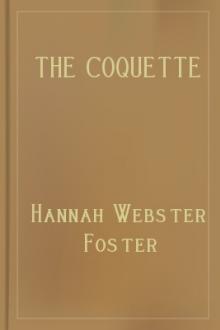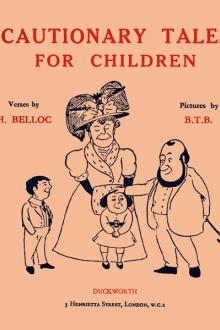The Coquette, Hannah Webster Foster [ebooks that read to you txt] 📗

- Author: Hannah Webster Foster
- Performer: -
Book online «The Coquette, Hannah Webster Foster [ebooks that read to you txt] 📗». Author Hannah Webster Foster
Pray write me impartially; let me know your real sentiments, for I rely greatly upon your opinion. I am, &c.,
ELIZA WHARTON. LETTER XXVII. TO THE REV. MR. BOYER. NEW HAVEN.I am quite a convert to Pope's assertion, that
"Every woman is at heart a rake."
How else can we account for the pleasure which they evidently receive from the society, the flattery, the caresses of men of that character? Even the most virtuous of them seem naturally prone to gayety, to pleasure, and, I had almost said, to dissipation. How else shall we account for the existence of this disposition in your favorite fair? It cannot be the result of her education. Such a one as she has received is calculated to give her a very different turn of mind. You must forgive me, my friend, for I am a little vexed and alarmed on your-account. I went last evening to the assembly, as I told you in my last that I intended. I was purposely without a partner, that I might have the liberty to exercise my gallantry as circumstances should invite. Indeed I must own that my particular design was to observe Miss Wharton's movements, being rather inclined to jealousy in your behalf. She was handed into the assembly room by Major Sanford. The brilliance of their appearance, the levity of their manners, and the contrast of their characters I found to be a general subject of speculation. I endeavored to associate with Miss Wharton, but found it impossible to detach her a moment from the coxcomb who attended her. If she has any idea of a connection with you, why does she continue to associate with another, especially with one of so opposite a description? I am seriously afraid that there is more intimacy between them than there ought to be, considering the encouragement she has given you.
I hope you will not be offended by my freedom in this matter. It originates in a concern for your honor and future happiness. I am anxious lest you should be made the dupe of a coquette, and your peace of mind fall a sacrifice to an artful debauchee. Yet I must believe that Miss Wharton has, in reality, all that virtue and good sense of which she enjoys the reputation; but her present conduct is mysterious.
I have said enough (more than I ought, perhaps) to awaken your attention to circumstances which may lead to important events. If they appear of little or no consequence to you, you will at least ascribe the mention of them to motives of sincere regard in your friend and humble servant,
T. SELBY. LETTER XXVIII. TO MR. CHARLES DEIGHTON. NEW HAVEN.I go on finely with my amour. I have every encouragement that I could wish. Indeed my fair one does not verbally declare in my favor; but then, according to the vulgar proverb, that "actions speak louder than words," I have no reason to complain; since she evidently approves my gallantry, is pleased with my company, and listens to my flattery. Her sagacious friends have undoubtedly given her a detail of my vices. If, therefore, my past conduct has been repugnant to her notions of propriety, why does she not act consistently, and refuse at once to associate with a man whose character she cannot esteem? But no; that, Charles, is no part of the female plan; our entrapping a few of their sex only discovers the gayety of our dispositions, the insinuating graces of our manners, and the irresistible charms of our persons and address. These qualifications are very alluring to the sprightly fancy of the fair. They think to enjoy the pleasures which result from this source, while their vanity and ignorance prompt each one to imagine herself superior to delusion, and to anticipate the honor of reclaiming the libertine and reforming the rake. I don't know, however, but this girl will really have that merit with me; for I am so much attached to her that I begin to suspect I should sooner become a convert to sobriety than lose her. I cannot find that I have made much impression on her heart as yet. Want of success in this point mortifies me extremely, as it is the first time I ever failed. Besides, I am apprehensive that she is prepossessed in favor of the other swain, the clerical lover, whom I have mentioned to you before. The chord, therefore, upon which I play the most, is the dissimilarity of their dispositions and pleasures. I endeavor to detach her from him, and disaffect her towards him; knowing that, if I can separate them entirely, I shall be more likely to succeed in my plan. Not that I have any thoughts of marrying her myself; that will not do at present. But I love her too well to see her connected with another for life. I must own myself a little revengeful, too, in this affair. I wish to punish her friends, as she calls them, for their malice towards me, for their cold and negligent treatment of me whenever I go to the house. I know that to frustrate their designs of a connection between Mr. Boyer and Eliza would be a grievous disappointment. I have not yet determined to seduce her, though, with all her pretensions to virtue, I do not think it impossible. And if I should, she can blame none but herself, since she knows my character, and has no reason to wonder if I act consistently with it. If she will play with a lion, let her beware of his paw, I say. At present, I wish innocently to enjoy her society; it is a luxury which I never tasted before. She is the very soul of pleasure. The gayest circle is irradiated by her presence, and the highest entertainment receives its greatest charms from her smiles. Besides, I have purchased the seat of Captain Pribble, about a mile from her mother's; and can I think of suffering her to leave the neighborhood just as I enter it? I shall exert every nerve to prevent that, and hope to meet with the usual success of
PETER SANFORD. LETTER XXIX. TO MISS ELIZA WHARTON. HARTFORD.You desire me to write to you, my friend; but if you had not, I should by no means have refrained. I tremble at the precipice on which you stand, and must echo and reëcho the seasonable admonition of the excellent Mrs. Richman, "Beware of the delusions of fancy." You are strangely infatuated by them! Let not the magic arts of that worthless Sanford lead you, like an ignis fatuus, from the path of rectitude and virtue.
I do not find, in all your conversations with him, that one word about marriage drops from his lips. This is mysterious. No, it is characteristic of the man. Suppose, however, that his views are honorable; yet what can you expect, what can you promise yourself, from such a connection? "A reformed rake," you say, "makes the best husband"—a trite, but a very erroneous maxim, as the fatal experience of thousands of our sex can testify. In the first place, I believe that rakes very seldom do reform while their fortunes and constitutions enable them to pursue their licentious pleasures. But even allowing this to happen; can a woman of refinement and delicacy enjoy the society of a man whose mind has been corrupted, whose taste has been vitiated, and who has contracted a depravity, both of sentiment and manners, which no degree of repentance can wholly efface? Besides, of true love they are absolutely incapable. Their passions have been much too hackneyed to admit so pure a flame. You cannot anticipate sincere and lasting respect from them. They have been so long accustomed to the company of those of our sex who deserve no esteem, that the greatest dignity and purity of character can never excite it in their breasts. They are naturally prone to jealousy. Habituated to an intercourse with the baser part of the sex, they level the whole, and seldom believe any to be incorruptible. They are always hardhearted and cruel. How else could they triumph in the miseries which they frequently occasion? Their specious manners may render them agreeable companions abroad, but at home the evil propensities of their minds will invariably predominate. They are steeled against the tender affections which render domestic life delightful; strangers to the kind, the endearing sympathies of husband, father, and friend. The thousand nameless attentions which soften the rugged path of life are neglected, and deemed unworthy of notice, by persons who have been inured to scenes of dissipation and debauchery. And is a man of this description to be the partner, the companion, the bosom friend of my Eliza? Forbid it, Heaven! Let not the noble qualities so lavishly bestowed upon her be thus unworthily sacrificed!
You seem to be particularly charmed with the fortune of Major Sanford, with the gayety of his appearance, with the splendor of his equipage, with the politeness of his manners, with what you call the graces of his person. These, alas! are superficial, insnaring endowments. As to fortune, prudence, economy, and regularity are necessary to preserve it when possessed. Of these Major Sanford is certainly destitute—unless common fame (which more frequently tells the truth than some are willing to allow) does him great injustice. As to external parade, it will not satisfy the rational mind when it aspires to those substantial pleasures for which yours is formed. And as to the graces of person and manners, they are but a wretched substitute for those virtues which adorn and dignify human life. Can you, who have always been used to serenity and order in a family, to rational, refined, and improving conversation, relinquish them, and launch into the whirlpool of frivolity, where the correct taste and the delicate sensibility which you possess must constantly be wounded by the frothy and illiberal sallies of licentious wit?
This, my dear, is but a faint picture of the situation to which you seem inclined. Reverse the scene, and you will perceive the alternative which is submitted to your option in a virtuous connection with Mr. Boyer. Remember that you are acting for life, and that your happiness in this world, perhaps in the next, depends on your present choice.
I called last evening to see your mamma. She is fondly anticipating your return, and rejoicing in the prospect of your agreeable and speedy settlement. I could not find it in my heart to distress her by intimating that you had other views. I wish her benevolent bosom nevermore to feel the pangs of disappointed hope.
I am busily engaged in preparing for my nuptials. The solemn words, "As long as ye both shall live," render me thoughtful and serious. I hope for your enlivening presence soon, which will prove a seasonable cordial to the spirits of your
LUCY FREEMAN. LETTER XXX. TO MISS LUCY FREEMAN. NEW HAVEN.I believe your spirits need a cordial indeed, my dear Lucy, after drawing so dreadful a portrait of my swain. But I call him mine no longer. I renounce him entirely. My friends shall be gratified; and if their predictions are verified, I shall be happy in a union with a man of their choice. General Richman and lady have labored abundantly to prove that my ruin was inevitable if I did not immediately break all intercourse with Major Sanford. I promised a compliance with their wishes, and have accomplished the task, though a hard one I found it. Last Thursday he was here, and desired leave to spend an hour with me. I readily consented, assuring





Comments (0)